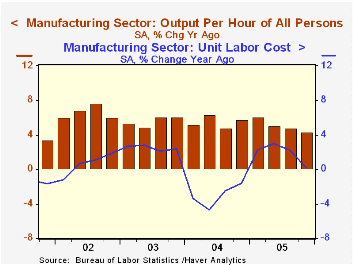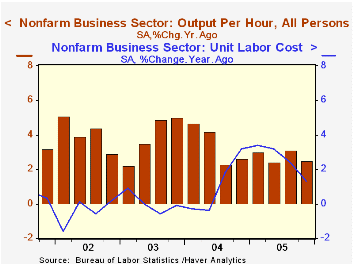 Global| Mar 07 2006
Global| Mar 07 2006Decline in 4Q U.S. Productivity Little Revised
by:Tom Moeller
|in:Economy in Brief
Summary
For 4Q '05, the decline in non-farm labor productivity was little revised at -0.5% versus the initial estimate of a 0.6% fall. It was the first decline in output per hour since 1Q '01 and followed an average gain of 3.7% during the [...]

For 4Q '05, the decline in non-farm labor productivity was little revised at -0.5% versus the initial estimate of a 0.6% fall. It was the first decline in output per hour since 1Q '01 and followed an average gain of 3.7% during the prior ten quarters. Consensus expectations had been for a slight upward revision to a 0.1% decline.
The initially reported slowdown in output growth which lowered productivity was moderated somewhat to 1.5% (3.7% y/y) from 4.7% during 3Q but hours worked rose slightly faster than initially estimated; 2.0% (1.2% y/y) versus a 0.4% 3Q rise.
Growth in compensation costs was unrevised at 2.8% but the 5.5% rise during 3Q was upwardly revised. Unit labor cost growth of 3.3% was the quickest in a year though y/y growth of 1.3% represented an easing of cost pressures.
Factory sector productivity growth was revised upward to 4.7% (4.3% y/y) from 3.9% following a 3.7% gain during 3Q. Compensation growth of 1.8% (4.5% y/y) was little revised and unit labor costs in the factory sector fell 2.8% (0.2% y/y).
The implicit price deflator for the nonfarm business sector was revised slightly higher to 3.4% (3.1% y/y) from 3.2%.
Stop Paying More for Less: Ways to Boost Productivity in Higher Education from the Federal Reserve Bank of St. Louis can be found here.
| Non-farm Business Sector (SAAR) | 4Q '05 (Revised) | 4Q '05 (Prelim.) | 3Q '05 | Y/Y | 2005 | 2004 | 2003 |
|---|---|---|---|---|---|---|---|
| Output per Hour | -0.5% | -0.6% | 4.5% | 2.5% | 2.7% | 3.4% | 3.9% |
| Compensation per Hour | 2.8% | 2.8% | 5.5% | 3.8% | 5.4% | 4.5% | 4.0% |
| Unit Labor Costs | 3.3% | 3.5% | 1.2% | 1.3% | 2.6% | 1.1% | 0.0% |
Tom Moeller
AuthorMore in Author Profile »Prior to joining Haver Analytics in 2000, Mr. Moeller worked as the Economist at Chancellor Capital Management from 1985 to 1999. There, he developed comprehensive economic forecasts and interpreted economic data for equity and fixed income portfolio managers. Also at Chancellor, Mr. Moeller worked as an equity analyst and was responsible for researching and rating companies in the economically sensitive automobile and housing industries for investment in Chancellor’s equity portfolio. Prior to joining Chancellor, Mr. Moeller was an Economist at Citibank from 1979 to 1984. He also analyzed pricing behavior in the metals industry for the Council on Wage and Price Stability in Washington, D.C. In 1999, Mr. Moeller received the award for most accurate forecast from the Forecasters' Club of New York. From 1990 to 1992 he was President of the New York Association for Business Economists. Mr. Moeller earned an M.B.A. in Finance from Fordham University, where he graduated in 1987. He holds a Bachelor of Arts in Economics from George Washington University.
More Economy in Brief
 Global| Feb 05 2026
Global| Feb 05 2026Charts of the Week: Balanced Policy, Resilient Data and AI Narratives
by:Andrew Cates






